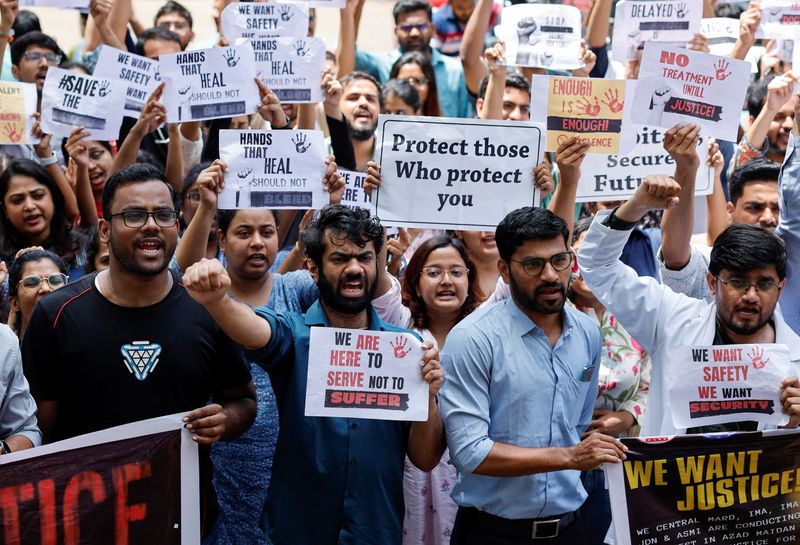By Subrata Nag Choudhary and Jatindra
KOLKATA/BHUBANESWAR, India (Reuters) – Hospitals and clinics across India turned away all but emergency patients on Saturday as medical staff began a 24-hour shutdown to protest the brutal rape and murder of a doctor in the eastern city of Kolkata.
More than a million doctors were expected to join the strike, paralyzing medical services in the world’s most populous nation. Hospitals said medical school faculty had been forced to work on emergency cases.
The government, in a statement released on Saturday after a meeting with representatives of medical associations, urged doctors to resume their activities in the public interest.
A 31-year-old medical trainee was raped and murdered last week inside the medical college where she worked in Kolkata, sparking nationwide protests among doctors and drawing parallels to the infamous gang-rape and murder of a 23-year-old student on a moving bus in New Delhi in 2012.
The strike, which began at 6 am (0030 GMT), has disrupted access to elective medical procedures and outpatient visits, according to a statement from the Indian Medical Association (IMA).
“All the junior doctors are on strike, so this would mean 90 percent of the doctors are on strike,” Sanjeev Singh Yadav, IMA representative in the southern state of Telangana, told Reuters.
According to news agency ANI, a heavy police presence was observed outside the RG Kar Medical College, where the crime took place, on Saturday, while the hospital premises were deserted.
Mamata Banerjee, chief minister of West Bengal, which includes Kolkata, has supported the protests across the state, demanding that the investigation be expedited and that the culprits be punished as severely as possible.
Several diagnostic centres and private clinics remained closed in Kolkata on Saturday.
Dr Sandip Saha, a private pediatrician in the city, told Reuters he would not treat patients except in emergencies.
Hospitals and clinics in Lucknow in Uttar Pradesh, Ahmedabad in Gujarat, Guwahati in Assam and Chennai in Tamil Nadu and other cities have joined the strike, which is set to be one of the largest hospital shutdowns in recent history.
‘HARD PUNISHMENT’
Patients lined up at hospitals, some unaware that the unrest would prevent them from getting medical care.
“I spent 500 rupees ($6) on the journey to come here. I have paralysis and a burning sensation in my feet, head and other parts of my body,” an unidentified patient at SCB Medical College Hospital in Odisha’s Cuttack city told local television.
“We didn’t know about the strike. What can we do? We have to go home.”
Raghunath Sahu, 45, who had queued at SCB Medical College and Hospital in Cuttack, told Reuters that the daily quota set by doctors to see patients had ended before noon.
“I brought my sick grandmother. They didn’t see her today. I’ll have to wait another day and try again,” Sahu said as he walked away from the queue.
According to a source in the Kolkata police, the Central Bureau of Investigation of India, the agency that probes the rape and murder, has summoned some medical students from the RG Kar Institute to ascertain the circumstances of the crime.
According to the source, the CBI also questioned the hospital principal on Friday.
The interrogation continued on Saturday, local television channels reported. One suspect is in the agency’s custody.
After the Delhi gang rape, the Indian government introduced sweeping changes to the criminal justice system, including tougher punishments, but activists say little has changed.
Anger over the failure of tougher laws to deter a rising tide of violence against women has fueled protests by doctors and women’s groups.
“Women constitute the majority of our profession in this country. We have repeatedly called for safety for them,” IMA president RV Asokan told Reuters on Friday.
The IMA has called for further legal measures to better protect health workers from violence and a speedy investigation into the “barbaric” crime in Kolkata.
“The punishment should be as severe as possible, come early and be remembered,” said criminal lawyer Shobha Gupta, who represented a Muslim woman who was gang-raped during religious riots that swept the western state of Gujarat in 2002.
“When we are still angry about the crime, the result should come. Punishment to play a deterrent role, should come faster.”

In its statement, the government said that a committee will be set up to suggest measures to further improve the protection of healthcare workers.
($1 = 83.8800 Indian rupees)





